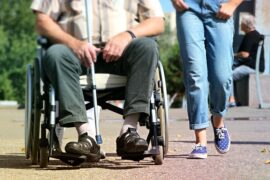Neglecting your mental health could be dangerous for your physical health. Dr. Glenn N. Levine, a medical school professor from Baylor College of Medicine, says that “A person’s mind, heart, and body are all interconnected and interdependent in what can be termed ‘the mind-heart-body connection.’ Research has demonstrated that negative psychological factors, personality traits, and mental health disorders can negatively impact cardiovascular health.”
Sameer Sacranie, a fitness and health expert, explains how mental health affects physical health and vice versa and some of the conditions that can be exacerbated by poor physical or mental health.
The Mind-Body Connection
Over the past few decades, medical researchers have come to recognize that the mind and body form one interconnected system. According to Dr. James Gordon of the University of Minnesota, “the brain and peripheral nervous system, the endocrine and immune systems, and indeed, all the organs of our body and all the emotional responses we have, share a common chemical language and are constantly communicating with one another.”
Treatments that affect the mind affect the body as well. When patients receive relief from anxiety and depression, this takes the pressure off the body’s systems. The expression “healthy body, healthy mind” may seem like a truism, but it is borne out by science.
Simultaneously, mental health disorders can be one of the contributing factors to physical problems. Having anxiety, depression, or bipolar disorder is connected with poor cardiovascular health and a greater chance of heart attack, stroke, and high blood pressure.
Ways To Improve Mental And Physical Health
The first and most important way to improve your mental health is to seek treatment for your issues. Admitting to yourself that you are struggling takes a great deal of bravery, and many people are biased against receiving treatment for mental health disorders. This bias has no scientific basis, and people should be aware that they affect the balance of their bodies if they neglect their physical and mental health.
When mental health disorders go untreated, they cause an imbalance in the body and mind. People who have anxiety often experience a racing heart, chest pains, and high blood pressure. People who have depression are more prone to chronic pain, diabetes, and cancer. These connections can be exacerbated by genetics and prior life experiences, but frequently they are directly affected by a person’s present mental state.
Exercise can be an easy prescription for improving both mental and physical health. Exercise causes the brain to release endorphins, the “feel-good” chemicals. It improves physical health by enhancing cardiac strength, helping with breathing and digestive issues, and improving metabolism.

The Link Between Obesity And Damaged Health
One physical condition that has a particularly strong connection to poor physical and mental health is obesity. Obesity can cause many of the same physical health conditions as poor mental health. If you are significantly overweight, it is a good idea to talk to your doctor about ways you can lose weight. Slow and steady weight loss of approximately 1-2 pounds a week is best. Still, some patients with significant obesity and health problems may want to undergo bariatric surgery for a more rapid weight loss.
Your Attitude Matters
When you feel despair about your mental or physical health, you will only make things worse for yourself. Do all you can to improve your physical and mental health, and as your mental health improves, you will feel more able to have an optimistic mindset toward supporting your health.
Understandably, people with severe depression, anxiety, bipolar disorder, and other mental health conditions would have difficulty feeling optimistic. Be as gentle with yourself as you can, and focus on making small changes to your lifestyle that will help you feel better.
Here are some suggestions for improving your mental and physical health:
- Try using a light therapy box for seasonal depression.
- Walk at least 30 minutes per day.
- Be sure to take all of your medications for physical and mental health as prescribed, and do not go off your mental health medications if you feel better without your doctor’s participation.
- Eat a healthy and balanced diet.
Complementary therapies like meditation, mindfulness, yoga, tai chi, and some types of dance can also help to soothe the mind-body connection.

There Is Hope
People with existing mental health or physical health conditions should know that there is room for improvement in both and that they should not feel as if they can give up on improving their minds and bodies.
If you feel that you may have a mental health problem, it is essential to see your primary health care provider. Your primary care provider can refer you to a therapist or psychiatrist to receive treatment for your difficulties. When mental health conditions are fully treated, they are less likely to cause problems with your physical health.
Sameer Sacranie believes that all people need to take their mental and physical health seriously. Preventive care, cancer screenings, a proper diet, and regular exercise will go a long way toward helping people survive psychological and physical health disorders.
*collaborative post



































